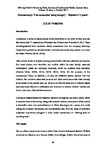Commentary: "I do remember being hungry," Ophelia's i-poem
| dc.contributor.author | Parsons, Julie Milroy | |
| dc.date.accessioned | 2019-08-14T15:44:36Z | |
| dc.date.available | 2019-08-14T15:44:36Z | |
| dc.date.issued | 2017-10-02 | |
| dc.identifier.issn | 1478-6737 | |
| dc.identifier.uri | http://hdl.handle.net/10026.1/14796 | |
| dc.description.abstract |
This paper makes reference to embodied foodways or the attempt to articulate the often-complex affective relationship between food and the body. It is one of five themes (family, maternal, health, embodiment and epicurean) identified after analysis of seventy-five (forty-nine female and twenty-six male) auto/biographical narratives received from respondents who engaged in a series of asynchronous online interviews on the topic of food over the life-course throughout 9 months in 2011 (Parsons 2015). All of the food autobiographies were rich, emotional and evocative socio-historical descriptions of everyday ways of ‘doing’ food. Here, I focus specifically on Ophelia’s e-mail exchanges, because she prefers to feed others rather than herself and is critical of “eating disorders”, despite difficulties nourishing herself after the death of her mother when she was 12. I make use of the “i-poem” which is constructed as part of the second stage of a four-step process developed by Mauthner and Doucet (1998) from Gilligan (1982), referred to as the Voice Centred Relational Method (VCRM). This analytical approach centres on the ‘voice’ of the respondent, with all of the ‘I’, ‘we’ and ‘you’ statements highlighted in order to illustrate how the respondent may think, feel or speak. These are taken from the narrative and written out in the order that they appear and as such, become strong expressions of intent. In Ophelia’s case her food story begins with a focus on hunger and a lack of maternal love explored through relationships with food. Overall, she argues that throughout her life she has craved nourishment for herself whilst admitting that she does not really like food very much at all. At the end she claims, “I fear we are lost!” | |
| dc.language.iso | en | |
| dc.title | Commentary: "I do remember being hungry," Ophelia's i-poem | |
| dc.type | journal-article | |
| plymouth.author-url | http://www.psychosocial-studies-association.org/wp-content/uploads/2017/10/Julie-Parsons-Commentary-I-do-remember-being-hungry-Ophelias-i-poem.pdf | |
| plymouth.issue | 2 | |
| plymouth.volume | 10 | |
| plymouth.publisher-url | http://www.psychosocial-studies-association.org/volume-10-issue-2-october-2017/ | |
| plymouth.journal | Journal of Psychosocial Studies | |
| plymouth.organisational-group | /Plymouth | |
| plymouth.organisational-group | /Plymouth/Faculty of Arts, Humanities and Business | |
| plymouth.organisational-group | /Plymouth/REF 2021 Researchers by UoA | |
| plymouth.organisational-group | /Plymouth/REF 2021 Researchers by UoA/UoA20 Social Work and Social Policy | |
| plymouth.organisational-group | /Plymouth/Research Groups | |
| plymouth.organisational-group | /Plymouth/Research Groups/Institute of Health and Community | |
| plymouth.organisational-group | /Plymouth/Users by role | |
| plymouth.organisational-group | /Plymouth/Users by role/Academics | |
| dcterms.dateAccepted | 2017-04-09 | |
| dc.identifier.eissn | 1478-6737 | |
| dc.rights.embargoperiod | Not known | |
| rioxxterms.licenseref.uri | http://www.rioxx.net/licenses/all-rights-reserved | |
| rioxxterms.licenseref.startdate | 2017-10-02 | |
| rioxxterms.type | Journal Article/Review |


